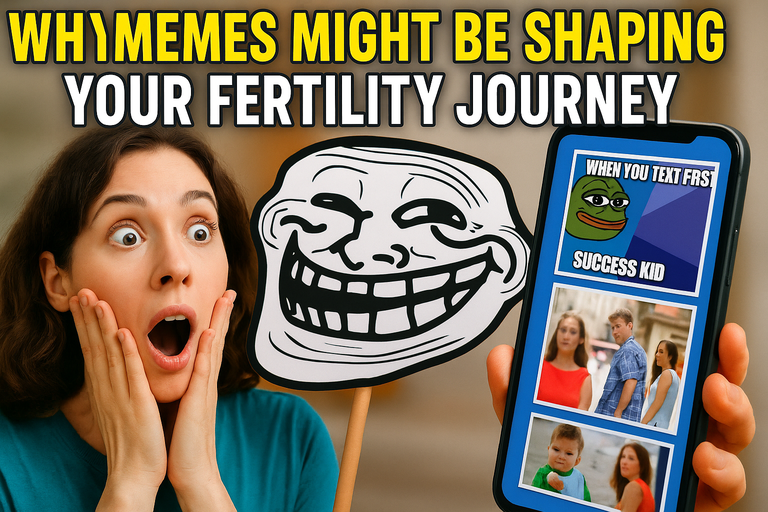Have you ever felt like your fertility journey has to be perfect to finally succeed? Like every step needs to be precise, every emotion in check, every moment flawless? If so, you’re not alone. In fact, the cultural tide is shifting, welcoming a new narrative — one where messiness, imperfection, and raw honesty are not only accepted but celebrated. And this shift is exactly what many trying to conceive desperately need to hear right now.
Recently, the artist Lorde released her new album, Virgin, which has been described as "messy, emotional, and perfectly suited for the moment." Her candid openness about topics like sex, drugs, and eating disorders mirrors a broader cultural embrace of imperfection and vulnerability. It’s a powerful reminder that life — especially the deeply personal and challenging parts — rarely fits into tidy, picture-perfect boxes.
So what does this have to do with your fertility journey?
Everything.
Trying to conceive at home or navigating fertility challenges often feels like walking a tightrope: there's pressure to stay positive, follow every rule, and control every variable. Yet, as Lorde’s new album reminds us, life’s beauty often lies in its unpredictability and messiness. This perspective invites us to let go of rigid expectations and instead, embrace our experiences with compassion and authenticity.
The Emotional Rollercoaster of Fertility: Why It’s OK to Feel Messy
If you’re using tools like at-home insemination kits — perhaps from trusted partners like MakeAMom — you already know the mix of hope and anxiety that colors this path. MakeAMom offers innovative, reusable kits that help individuals and couples conceive outside traditional clinical settings, empowering people to take control in a way that feels private and manageable. Yet, even with the best tools, the emotional ups and downs remain.
Feeling frustrated, overwhelmed, or uncertain isn’t a sign of failure. It’s a natural human response to the complexity of fertility.
- Embrace your feelings, even the uncomfortable ones. Let yourself cry, scream, or journal your thoughts.
- Talk openly with your partner or support network about your emotional landscape.
- Remember that imperfection is part of the process.
In a world that often glorifies only the 'success stories,' your authentic experience — messy, beautiful, and imperfect — holds immense value.
Reframing Your Fertility Journey: From Pressure to Possibility
What happens when you shift the narrative from "I must do this perfectly" to "I’m learning and growing through this process"?
- You reduce stress, which science shows can improve fertility outcomes.
- You become more present and mindful, appreciating small victories along the way.
- You build resilience, better preparing yourself emotionally for whatever outcomes may arise.
This mindset shift allows you to reclaim your fertility journey as yours — unique and authentic.
Practical Steps to Cultivate Emotional Wellness as You Try to Conceive
- Mindfulness & Meditation: Simple daily practices can help center your thoughts and calm anxiety.
- Connect with Communities: Whether online or in-person, sharing stories with others on the same journey diminishes isolation.
- Educate Yourself: Understanding options like home insemination kits tailored to your specific needs (like low motility or sensitivities) can boost confidence and reduce uncertainty.
- Celebrate Every Step: From learning about your cycle to using tools like MakeAMom’s CryoBaby or BabyMaker kits, acknowledge your courage.
Why MakeAMom’s Approach Resonates with This New Narrative
MakeAMom isn’t just a company selling insemination kits; they’re part of a movement toward empowerment, accessibility, and honesty in conception. Their plain packaging respects privacy, and their kits’ reusability honors both sustainability and practicality. With a reported 67% success rate, MakeAMom offers more than products — they provide hope and agency in a landscape often fraught with stress and stigma.
You can explore how these thoughtfully designed tools can fit into your unique journey by visiting their website and learning more about personalized options that match your fertility profile.
Embrace the Beautiful Mess
Like Lorde’s Virgin album, your fertility story might be emotional, complicated, and far from perfect. But guess what? That’s exactly what makes it real and powerful.
So, the next time you feel overwhelmed, remember this: You don’t have to have it all figured out. You don’t have to hide your struggles or paint a perfect picture. Embracing the messiness is a revolutionary act of self-love and strength.
Your path to parenthood is uniquely yours — messy, emotional, imperfect, and absolutely beautiful.
What part of your fertility journey has surprised you the most? Share your story in the comments — let’s support each other through every twist and turn.
Inspired by this Business Insider review of Lorde’s album Virgin, reminding us that embracing life’s imperfections can be a powerful healing force.

